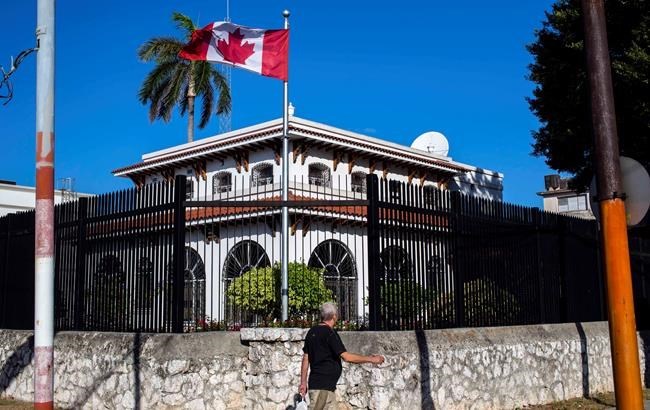
FILE - In this April 17, 2018 file photo, a man walks beside the Canadian embassy in Havana, Cuba. THE CANADIAN PRESS/AP-Desmond Boylan
March 01, 2023 - 2:47 PM
WASHINGTON - The White House says a new report debunking the idea that "Havana syndrome" was the work of a foreign adversary won't diminish President Joe Biden's support for its victims.
U.S. intelligence officials say they have found no single cause for the hundreds of cases of brain-related injuries reported by foreign emissaries and their staff in Cuba since 2017.
The victims include Canadians, in particular a number of Canadian diplomats, staffers and family members who fell ill while posted to Havana.
Symptoms include headaches, loss of memory, inability to concentrate, cognitive and vision problems, noise sensitivity, dizziness, nausea, sleep disturbances, mood changes and nosebleeds.
White House press secretary Karine Jean-Pierre says the report should in no way be seen as diminishing the experiences shared by countless civil servants.
She says U.S. families and their colleagues in the workforce will continue to get the support that they need.
Officials who briefed select U.S. media outlets Wednesday say that rather than finding evidence of a foreign plot, they have uncovered the opposite.
In some cases, the U.S. detected among adversarial governments confusion about the allegations and suspicions that Havana syndrome was an American plot.
Investigators found "no credible evidence" that any adversary had obtained a weapon that could cause the reported symptoms or a listening device that might inadvertently injure people.
In Canada, a former Supreme Court justice has been appointed to mediate claims against the federal government from nine family members of Canadian diplomats who suffered unexplained ailments in Cuba.
A group of at least 18 plaintiffs is also part of a Federal Court action filed in 2019 seeking millions of dollars in damages from the Canadian government after becoming mysteriously ill while posted to Havana.
As of July last year, Global Affairs Canada said 15 Canadians had received a confirmed working diagnosis of "acquired brain injury."
The Biden administration, too, has been under pressure to respond to Havana Syndrome cases from government personnel who have reported injuries and their advocates, including members of Congress.
President Joe Biden in 2021 signed into law the HAVANA Act, which provided compensation to people deemed to have sustained injuries consistent with what the government calls "anomalous health incidents."
This report by The Canadian Press was first published March 1, 2023.
— With files from The Associated Press
News from © The Canadian Press, 2023